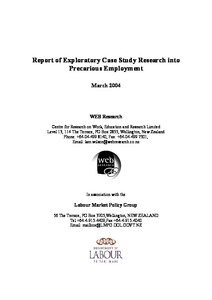Report of exploratory case study research into precarious employment
"This paper reports on case study research into non-standard employment in four industries (cleaning, call centres, construction labour hire and fish processing), and investigates the factors that contribute to employment being experienced as "precarious". In order to increase the De...
| Main Authors: | , |
|---|---|
| Institution: | ETUI-European Trade Union Institute |
| Format: | TEXT |
| Language: | English |
| Published: |
Wellington
2004
Department of Labour |
| Subjects: | |
| Online Access: | https://www.labourline.org/KENTIKA-19292545124910107279-Report-of-exploratory-case-stu.htm |
| Summary: | "This paper reports on case study research into non-standard employment in four industries (cleaning, call centres, construction labour hire and fish processing), and investigates the factors that contribute to employment being experienced as "precarious".
In order to increase the Department of Labour's (DoL) knowledge and understanding of non-standard employment arrangements and the impact that non-standard employment arrangements may have on both workers and employers, exploratory case studies have been undertaken in four industries (cleaning, call centres, construction labour hire and fish processing).
It was expected that "precarious" forms of employment may occur for some employees in these industries. The case studies provided an opportunity to gather information on precarious employment and to test a "working definition" of precariousness developed by DoL in an earlier literature review.
In this study, we found many employees who were prepared to enter casual or temporary employment under a variety of terms to meet their needs. More employees in this study reported feeling overworked or underpaid or felt dissatisfied with their employment than reported experiencing their work as "precarious".
Employees reported experiencing their form of work as precarious when they were: not getting a fair day's pay for the fair day's work they undertook; not treated fairly at work; not able to earn enough to live as they aspired even if those aspirations were modest, or; afraid that their family could not survive, or was suffering, because of the state they were in considering their work and home lives. The negative impact most frequently reported to us by people in precarious work was their lack of participation in the lives of their children.
The study also suggested that permanent (i.e. "standard") employment may in some circumstances be experienced as precarious, and that casual employment is not necessarily experienced as precarious. There is an increasing variety of non-standard forms of work but those forms are not necessarily precarious. Precarious employment is also not the same thing as receiving low pay, or possessing low skills.
On the basis of the research we suggest that:
oa significant proportion of those employed are engaged in non-standard forms of employment (e.g. part-time work, contracting, temporary or casual jobs), although it is difficult to say whether this is becoming more or less common
onon-standard work cannot be directly equated with precarious work. Whether someone feels their employment to be precarious or not depends on a complicated interaction between the conditions of the job itself, the general economic and social environment, and the person's aspirations
othere are people in the industries surveyed who experience their employment as "precarious", and this has negative implications for the degree and quality of their participation in their family and wider social life." |
|---|---|
| Physical Description: | 97 p. Digital |

